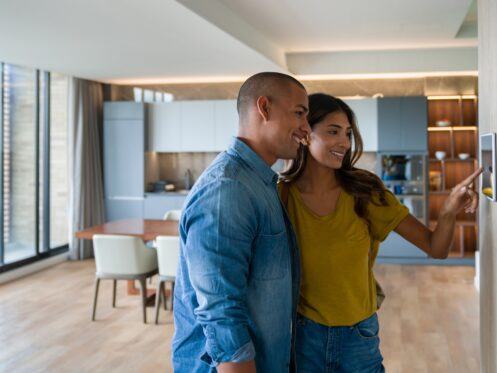Finding the right air conditioner settings may have you feeling a little frustrated. You’re looking for a setting that will keep you comfortable without sending your energy costs soaring. One handy trick to know is that you don’t have to keep your cooling system at the same temperature all summer long. Instead, you can pick different thermostat settings for different situations.
Best Temperature for Your Air Conditioner
Air conditioner settings are a personal thing. What works for you might not work for someone else. You’ll want to choose an indoor air temperature that keeps you comfortable at home.
Even still, you might be interested in what the experts have to say about the best temperature level for your house. Energy Star and the Department of Energy encourage people to set their thermostats at 78 degrees during the summer.
That might seem high to you. Many people prefer an indoor temperature in the lower 70s. However, if you can get accustomed to having your home at a balmy 78, you’ll conserve energy and save money.
Perhaps you aren’t sure you can live with a 78-degree home in summer, but you’re interested in reducing your cooling costs. Try bringing your thermostat up a few degrees from where you’ve been keeping it. Each degree you raise the temp may bring your energy bills down by about 3%. Over time, the savings from choosing a slightly warmer temperature can really add up.
Overnight AC for Comfort and Savings
You might be able to nudge the air conditioner up a few degrees for the overnight hours. It’s possible that you won’t notice a warmer temperature as you’re sleeping.
The Energy Star recommendation is to choose a nighttime AC setting that’s 4 degrees more than your daytime one. Anyone following the advice to keep the house at 78 degrees would set the overnight temperature to 82. Even if your starting temp is different, you can do the math to figure out a comparable nighttime setting.
Thermostat Settings for When You’re Not Home
Like many houses, yours might sit empty for much of the workday. If that’s the case, then you may want to adjust your thermostat. Keeping the temperature steady when no one is there to enjoy the cool air can be a waste of money.
The standard advice is to pick an away temperature that’s 7 degrees higher than your usual one. If you stick with Energy Star’s recommended 78 degrees, then you’ll turn the thermostat to 85 before heading out for the day. It’s usually a good idea to switch to that temperature whenever the house will be empty for two hours or more.
If you have pets, you may want to think twice before adopting this plan, though. Your furry friends will appreciate it if you keep the house closer to its normal temperature even if you’re not home. That’s especially true for dogs. Cats, on the other hand, don’t mind warm temperatures as much, so they might be less bothered by a warm house.
Temperature for Your House When You’re on Vacation
If you and your animals leave on a trip, you might want to turn the thermostat up higher still. Since no one will be setting foot in the house for a while, you could consider running the air conditioner at a temp that’s 10 degrees higher than normal.
For houses that are normally 78 degrees, that would mean turning the thermostat to 88 during your extended absence. At that setting, your AC will still kick on a few times during the hottest of days, but you’ll save a good deal of money on cooling costs.
FAQs About Air Conditioner Temperature Settings
The more you learn about air conditioner settings, the more effective you’ll be at keeping your house at the perfect temperature. Here are some common questions homeowners have.
Should You Turn Your AC Off When You Leave?
Considering the money savings that turning up the thermostat can bring, you might wonder what turning off the unit completely would do. Perhaps you’re tempted to switch off the power whenever you’re gone for the day.
Yes, shutting down the air conditioner would save money. That doesn’t mean it would be the best choice, though. You’d be putting a decent amount of wear on your system by regularly powering it off and on.
Plus, your air conditioner helps keep indoor humidity in check, improving your indoor air quality. If the AC doesn’t run for hours at a time on a sweltering day, the humidity level will start creeping upward. High humidity can lead to peeling wallpaper, warped wood, and mold growth.
Should You Turn the Settings Drastically Down When You Get Home?
When you return to a warmer-than-normal house, you’re probably anxious to get your space cool as quickly as possible. Like many people, you might assume that turning your thermostat way down will help you achieve that goal.
Unfortunately, energy experts say that’s not the case. Your home won’t cool down any faster. You’ll just run the risk of demanding more from your air conditioner and spending more on electricity.
Turn the thermostat back to your preferred setting and wait patiently. Your home will reach the right temperature soon enough.
What’s the Best Way to Control Your AC?
With a programmable thermostat, you can automate your AC settings. This device will let you establish a cooling schedule that aligns with your family’s regular comings and goings. Often, you can choose one set of temperatures for weekdays and another set for weekends.
A smart thermostat can be even more useful. With a companion phone app, you can control your thermostat from anywhere. If you forget to turn up the temp before leaving, you can do it from afar. Shortly before returning home, you can initiate the cool-down process.
Are There Ways to Supplement the Air Conditioner?
You might find a 78-degree home more tolerable if you’re not relying on the AC alone for cooling. Running fans can make a huge difference in how you feel. Both floor models and ceiling fans can help. Fans positioned near your vents are useful for directing cool air throughout the room. Ceiling fans that spin counterclockwise will move cool air downward.
Also, keep your shades drawn during the day to block the sun’s warm rays. Run your dishwasher and clothes dryer in the evening so that they don’t heat up your house. Switch on the bathroom’s exhaust fan whenever the shower is running. These simple steps can do a great job of keeping the indoor temperature under control.
Contact Us
When you have a question about your air conditioner or are looking for air conditioning services including AC maintenance, repairs, or installations, contact Specialty Heating & Cooling LLC. We also specialize in commercial and residential heat pumps and furnaces in Tigard and surrounding areas. Customers count on our water heater, ductwork, generator, and indoor air quality services as well. Our company, in business since 1985, is a multi-year recipient of the Carrier’s President’s Award. Choose our team for 24/7 repair services, accurate estimates, and a 100% satisfaction guarantee.
For the best in heating and cooling care, book your appointment with Specialty Heating & Cooling LLC in the Metro Portland area today.


